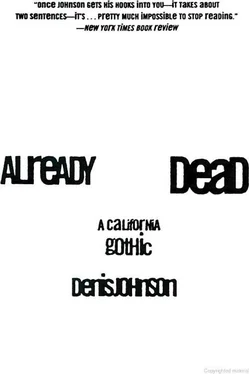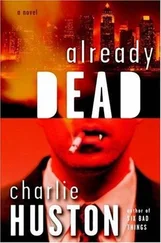I love my wife. I know what love is. I see what it is—” Apologetically, with his dirty forearm, he wiped at his lips and nose.
Melissa and Frank were like two spectacularly unmatched andirons, he on the raised hearth and she on the floor.
“You don’t know how tiny you are,” Fairchild told her.
Frankheimer laughed. Melissa regarded her knees and very nearly smiled.
“Let’s think about this,” Frankheimer said. “You up for that?”
“Thinking?”
“About Van Ness. You really want him? All his life, he’s worked the water. Water is his element.”
At half past six, very near to sunset, Navarro turned onto the road down to Arena Pier with his stomach growling.
Mo waited up at her place with two ribeye steaks, but he had to take care of this thing — because Merton had received the call, taken his own pulse, and diagnosed himself with a headache, putting Navarro’s own status at on-call and unfed. Also pissed off. But as he rolled past the water-treatment facility and left behind its tainted atmosphere and felt himself dropping out of sight of the town itself, dropping into the twilight and into the quiet of an hour that truly felt like 252 / Denis Johnson
autumn, his irritation gave over, and he was surprised to find himself drifting with a sickly and fascinated heart in the big machine along the flanks of tattered homes. Where the hills on either side opened out toward the harbor, the haphazard rows of rootless dwellings, trailers founded on cinder blocks and unmatched rounds of timber, and the kennels with their wire fences bellied out or torn, and the trucks without tires or windshields, and the axles, engines, and appliances stashed under fraying plastic, and the wood smoke, and the bleary windows, all of it tugged at him as if he’d lived here once and missed it ever since.
In this light it looked like somebody’s idea of art, maybe his own. It all seemed all right — depressing, yet special — it all seemed out of reach.
At the road’s end the new pier, its wood still clean, strode out over the purple water. He drove down there and stood by the cruiser’s open door studying the harbor’s surface, but saw nothing floating on it other than dark quiet vessels, no more than a dozen of them. He got behind the wheel again.
The trailers had no numbers, but according to his directions it was only a matter of locating the one with an aluminum canoe out front.
This he managed, and got out of the car and stood listening to small sounds which, by their separateness, made everything seem all the more quiet: a voice; a faucet; another voice; a refrigerator door; a TV
hiccuping through the channels. A dog lived under the canoe, a small husky that didn’t bark at him but just pulled at its chain, panting. Its bucket had toppled and rolled beyond its reach. Navarro set it right, and the animal plunged its head into the dark to chop at the inch of water remaining.
He knocked on the door in anticipation of the usual tableau, a couple of sad angry women, a couple of terrified kids, a couple of exhausted drunks with ripped shirts and rug burns. Only this time one of them would be wet from the sea.
But when a woman in a long quilted robe opened the door, the space behind her undisturbed and almost somber, he sensed he may have awakened her from a nap.
“Katrina Wells?”
“Mom.”
“Okay. Mom. Who’s fighting, Mom?”
“Mom called it in.”
“Anybody requiring assistance inside your house?”
“Let me locate my slippers.” The woman turned away, keeping the Already Dead / 253
door open with her hand, and next came out wearing black rubber boots on her feet. “She’s over here.”
He made way for her and followed across the yard to the adjacent trailer, the door of which she slapped with the flat of her hand. “Mom!
Your police have arrived!” She opened the door herself and went through. Navarro stood at the threshold and looked inside to find no recuperating combatants, only a teenaged boy on a kitchen stool, and a woman standing beside the gas range and saying, “Hah! Hah!”
“Katrina Wells?”
“Hah!” She gestured toward the youngster with her cigarette, which she held in the V of her thumb and index, the palm of her hand cupped beneath it. He’d seen monocled Nazis in the movies holding their cigarettes like that.
“I tell him fix his hair, his hair is silly. So he put on a hat. But the hat is silly, too! You see?”
“You’re not my mother,” the boy said.
“What is this about?” Navarro asked.
“You take your time, hah?”
“Previous shift took the call.”
“Well, he left a long time. He go. He gone.”
“She looks sillier than me,” the boy said. His grandmother, if that was the relationship, wore baggy jeans and what Navarro guessed must be a Mexican vest, and those pug-nosed duck boots. She looked like anybody. And the boy’s hat looked like anybody’s hat.
“You reported a fight?”
“Fighting. Two men.”
“Two people,” her daughter said, “maybe two men.”
“Two people! Men are people!”
“Wait, now. Who witnessed this?”
“I witness this. I.”
“Just her,” the daughter said.
“Did you recognize them?”
“They stand on the pier. Fighting.”
“Were you on the pier at the time?”
“No. Just here, from the kitchen. He had a stick, a pipe, something.”
“Okay, you think two men. Probably.”
“He hit him like a baseball.”
254 / Denis Johnson
“Then what?”
“He fell in! Then he stand there waiting to see is he coming up or is he drown.” She clamped her cigarette between her lips, hunched her spine, and raised her clasped hands to the level of her right ear. “Like this. Batter up!”
“What is your nationality, Mrs. Wells, may I ask you?” She took a step closer, fixing him dead-on with a hooded gaze.
“I — em — a—United States.”
In order to keep from laughing, Navarro opened his mouth and breathed through it. His training had included this. “You a baseball fan?”
Mrs. Wells vigorously nodded, sucking at her cigarette, and spoke through her smoke. “Very much. Eighty-eight I saw Oakland sweep Boston. I was there in Candlestick. Game number four.”
“Are you Italian maybe?”
“She’s not Italian,” the boy said. “She’s Slavic, and she’s crazy.”
“My dad married her about five years ago. He brought her from Yugoslavia.”
“Yugoslavia! So what?” Mrs. Wells asked.
“So one guy knocked another guy off the pier with a pipe or a stick and waited to see if he came back up. Did he?”
“Who? What?”
“Did the man who fell in come back up?”
“What am I telling you? No! Please understand me — this description is a major crime. I witness a murder.”
“And the guy with a stick—”
“Him? He throws it away. And I don’t know after that. I called the telephone to report my findings.”
“Did you see him leave the area?”
“I didn’t see — no. But he left — yes. I heard a car.”
“But you didn’t see him get into the car, or see who was in the car that you heard, is that right?”
“God! I’m sorry, but how did they give you a job on the police? What am I saying to you? He’s drown in there right now! Go get him out!”
“I already had a look. There’s nobody floating in the immediate vicinity.”
“Hah! But what about if he’s far away?”
“Exactly. That’s just the thing. So listen to me now, Mrs. Wells. I Already Dead / 255
want to nail it down as to when this happened, because if there’s a chance somebody’s floating around out at sea who can still be rescued and revived, then I’m gonna have to call for an operation that’s gonna keep a lot of people up working all night and run the county and state about fifteen thousand dollars. How long ago did you see this fight?”
Читать дальше












